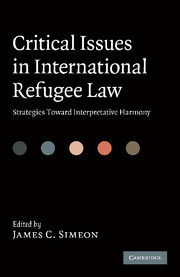Book contents
- Frontmatter
- Contents
- Notes on contributors
- Foreword by Justice Tony North
- Acknowledgements
- Introduction
- Chapter 1 From refugee to judge of refugee law
- Chapter 2 Individual risk, armed conflict and the standard of proof in complementary protection claims:
- Chapter 3 Running scared since 9/11:
- Chapter 4 Asymmetrical sovereignty and the refugee:
- Chapter 5 Economic harm as a basis for refugee status and the application of human rights law to the interpretation of economic persecution
- Chapter 6 The fragmented nature of the international refugee regime and its consequences:
- Index
- References
Introduction
the research workshop on critical issues in international refugee law and strategies towards interpretative harmony
Published online by Cambridge University Press: 17 February 2011
- Frontmatter
- Contents
- Notes on contributors
- Foreword by Justice Tony North
- Acknowledgements
- Introduction
- Chapter 1 From refugee to judge of refugee law
- Chapter 2 Individual risk, armed conflict and the standard of proof in complementary protection claims:
- Chapter 3 Running scared since 9/11:
- Chapter 4 Asymmetrical sovereignty and the refugee:
- Chapter 5 Economic harm as a basis for refugee status and the application of human rights law to the interpretation of economic persecution
- Chapter 6 The fragmented nature of the international refugee regime and its consequences:
- Index
- References
Summary
Introduction
It is perhaps trite to note that one of the most pressing humanitarian issues of our time is the plight of those who seek asylum from severe human rights abuse amounting to persecution. The latest annual report of the United Nations High Commissioner for Refugees (UNHCR) indicates that there are 42 million people who are uprooted in the world today. Amongst this staggering total of “people of concern” to the UNHCR are some 15.2 million refugees including 872,000 asylum seekers with pending cases. The UNHCR further estimates that in 2008 some 839,000 individual applications were submitted for refugee status and that 9 percent of those claims were made at UNHCR offices.
It is worth noting that the number of asylum seekers making individual claims for refugee status in 2008 rose for a second year in row, up by 28 percent, and that the Republic of South Africa was the largest single recipient of individual refugee status claims estimated at the incredible number of some 207,000 applications. The United States of America came in a distant second, with 49,600 refugee status claims, a mere one-quarter of the number that were received by South Africa. France, with 35,400 claims, and Sudan, with 35,100 claims, came in at third and fourth respectively. It is also interesting to point out that the Federal Republic of Germany was the only country in the Global North to be listed as a major refugee-hosting country in 2008 with 582,700 refugees.
- Type
- Chapter
- Information
- Critical Issues in International Refugee LawStrategies toward Interpretative Harmony, pp. 1 - 39Publisher: Cambridge University PressPrint publication year: 2010

